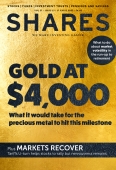Archived article
Please note that tax, investment, pension and ISA rules can change and the information and any views contained in this article may now be inaccurate.
Tesco shares drop on fears it will launch ‘price war’ to raise market share

Since taking over the helm at Tesco (TSCO) four years ago, chief executive Ken Murphy and the rest of the team have done a fine job of steering the grocery giant to record profits and its highest market share in a decade.
It was a surprise, therefore, when the shares dropped 6% on the day the company posted its 2024/25 annual results, but the reaction was based on what was to come rather than what went before.
For the year to the end of February, the group posted operating profit and free cash flow ahead of forecasts and investors were treated to a 13% increase in the dividend which together with share buybacks meant total shareholder returns for the year were £1.9 billion.
Chief executive Ken Murphy put the strong results down to the firm’s relentless focus on value, its highest grocery market share in almost a decade (roughly 28%) and increased customer satisfaction scores.
In terms of the outlook, Murphy said: ‘Building on our strong financial performance, robust balance sheet and positive momentum, we are setting ourselves up for the year ahead with the flexibility to continue to win in a highly competitive market.’
Murphy noted there had been ‘a further increase in the competitive intensity of the UK market’ since the start of the year but told analysts he was ‘determined to win’ in the battle for sales.
Therefore, in order to lure more shoppers through the doors, Tesco will divert a greater proportion of its 2025/26 profit to schemes such as successful Aldi Price Match and Clubcard Prices to deliver on its number one strategic goal of ‘magnetic value for customers’.
As a result, operating profit for 2025/2026 is likely to be between £2.7 billion and £3 billion or as much as 14% lower than last year depending on how much ‘firepower’ the firm needs to respond to current market conditions.
This news immediately triggered headlines along the lines of ‘Tesco to start price war’ and prompted Clive Black of Shore Capital to ‘get the knuckleduster out’ as he revised his forecasts downwards.
There is no question the market has become more competitive of late – discounters Aldi and Lidl now have a combined market share of 18.8%, well above even Sainsbury’s (SBRY), the number two full-line grocery chain.
However, Murphy smells an opportunity to take even more market share from smaller rivals Asda and Morrison by investing in prices and we suspect the dust will settle fairly quickly and investors will get behind his strategy.
Important information:
These articles are provided by Shares magazine which is published by AJ Bell Media, a part of AJ Bell. Shares is not written by AJ Bell.
Shares is provided for your general information and use and is not a personal recommendation to invest. It is not intended to be relied upon by you in making or not making any investment decisions. The investments referred to in these articles will not be suitable for all investors. If in doubt please seek appropriate independent financial advice.
Investors acting on the information in these articles do so at their own risk and AJ Bell Media and its staff do not accept liability for losses suffered by investors as a result of their investment decisions.
Issue contents
Editor's View
Feature
Great Ideas
News
- Housing services provider Mears hits five-year high on ’beat-and-raise’
- Weak US market and operational difficulties sink TT Electronics stock
- Tesco shares drop on fears it will launch ‘price war’ to raise market share
- Can Relx maintain its strong performance in the first quarter?
- Is this the end of the road for Tesla bulls?
- After discovery bright spot for BP what next for UK energy giants?
- Markets recover some poise after tariff U-turn
 magazine
magazine








